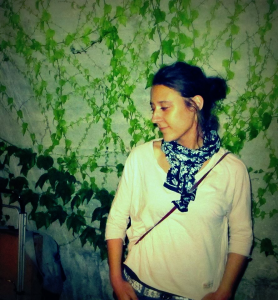CONTENTS
PHILOSOPHY
SOCIOLOGY & SOCIAL ANTHROPOLOGY
POLITICAL SCIENCE & PUBLIC ADMINISTRATION
LANGUAGES, ARTS & LITERATURE
HISTORY
Research Area 3: Objects, Traces, Mapping: Everyday Experience of Spaces
Contact: kuzvartova@cefres.cz
 The main interest of my research is to explore a) the socially engaged role of architects, b) the possibilities of different production of urban space in the cities of the Global South, namely São Paulo, Brazil. Continue reading Lenka Kužvartová: Research & CV
The main interest of my research is to explore a) the socially engaged role of architects, b) the possibilities of different production of urban space in the cities of the Global South, namely São Paulo, Brazil. Continue reading Lenka Kužvartová: Research & CV
Research Area 3: Objects, Traces, Mapping: Everyday Experience of Spaces
Contact: katalin.pataki@cefres.cz
 My PhD project investigates the implementation of the state-led church reforms carried out during the reign of Joseph II in the Hungarian Kingdom and intends to contribute to a better understanding of the new features of state power unfolding at the end of the 18th century. Continue reading Katalin Pataki: Research & CV
My PhD project investigates the implementation of the state-led church reforms carried out during the reign of Joseph II in the Hungarian Kingdom and intends to contribute to a better understanding of the new features of state power unfolding at the end of the 18th century. Continue reading Katalin Pataki: Research & CV
Research Area 2: Norms & Transgressions
Contact: filip.herza@cefres.cz
 My dissertation project traces the history of freak show culture in the 19th- and 20th-century Prague and the Czech lands from the perspective of disability theory. By studying popular exhibitions of “freaks” and other living “curiosities”, I try to explore reproduction of the 19th– and 20th-century disability discourse, including concepts and images of disability and related forms of socially produced “otherness”, namely class, gender and racial difference. I am particularly interested in the significance of the embodied “Other” in fashioning social norms and imaginary social bodies of the time, namely the collective body of nation. Four case studies from Prague’s freak show stages, ranging from 1860s through 1920s, demonstrate the significance of “abnormal” bodies for the imagined Czech national society. The project thus ventures into a disabled history of Czech nationalism, offering a new perspective on nation building and its interconnectedness with biopolitical reasoning, from the late 19th century up until the interwar period.
My dissertation project traces the history of freak show culture in the 19th- and 20th-century Prague and the Czech lands from the perspective of disability theory. By studying popular exhibitions of “freaks” and other living “curiosities”, I try to explore reproduction of the 19th– and 20th-century disability discourse, including concepts and images of disability and related forms of socially produced “otherness”, namely class, gender and racial difference. I am particularly interested in the significance of the embodied “Other” in fashioning social norms and imaginary social bodies of the time, namely the collective body of nation. Four case studies from Prague’s freak show stages, ranging from 1860s through 1920s, demonstrate the significance of “abnormal” bodies for the imagined Czech national society. The project thus ventures into a disabled history of Czech nationalism, offering a new perspective on nation building and its interconnectedness with biopolitical reasoning, from the late 19th century up until the interwar period.
Beside representations of disability in popular entertainment culture, Filip works on the history of science, expert cultures and social movements (such as social hygiene and eugenics) in the 19th and the 20th century, mainly from the perspective of gender, disability and postcolonial theory.
His latest research concerns disability, hygiene and health related politics in the colonial setting of interwar Czechoslovakia, particularly the activities of Czech scientists in Slovakia and Subcarpathian Ruthenia.
CV
Education
Filip holds a Mgr. in cultural and social anthropology from the Faculty of humanities, Charles university Prague (2012), where he also pursue his PhD, under the supervision of PhDr. Lucie Storchová, Ph.D.
Academic jobs and fellowships
From 2017, Filip works as a researcher at the department of gender studies and from 2018 as an assistant professor at the department of anthropology, Faculty of humanities, Charles University Prague. In the years 2014-2016, Filip received fellowships from the University of Vienna, Central European University Budapest and Collegium Carolinum in Munich.
Research projects
2017-2019 Joint grant project GAČR (Czech Grant Agency) and DFG (Deutsche Forschungsgemeinschaft): (Post)Socialist Modernity and social and cultural politics of disability and disablement
2017-2018 Participation on an international project called Staged Otherness: Human Oddities in Central and Eastern Europe 1850-1939 (Polska Akademia Nauk)
Selected Publications
Herza, Filip. (forthcoming). “Faces of Masculinity: Shaving Practices And The Popular Exhibitions Of “Hairy Wonders” In Early 20th Century Prague”. In Beauty And The Norm: Debating Standardization In Bodily Appearance. Palgrave Macmillan.
Herza, Filip. 2016. “Anthropologists and Their Monsters: Ethnicity, Body and Ab/normality In Early Czech Anthropology”. East Central Europe 43 (1-2). Leiden: Brill: 64-98.
Herza, Filip. 2016. “Black Don Juan and The Ashanti From Asch: Representations Of “Africans” In Prague And Vienna, 1892–1899”. In Visualising The Orient: Central Europe And The Near East In The 19Th And 20Th Centuries, Adéla Jůnová Macková, Lucie Storchová, and Libor Jůn, 95-106. Prague: Academy of Performing Arts in Prague (AMU), Film and TV School of Academy of Performing Arts in Prague (FAMU).
Herza, Filip. 2012. “Tiny Artists From The Big World: The Rhetoric Of Representing Extraordinary Bodies During The Singer Midgets’ 1928 Tour In Prague”. In Exploring The Cultural History Of Continental European Freak Shows And ‘Enfreakment’, 193-210. Newcastle upon Tyne: Cambridge Scholars Publishing.
Research Area 2: Norms & Transgressions
Contact: magdalena.cabaj@cefres.cz
 My dissertation discusses intersex as an emancipatory figure with a great subversive potential, which through the ages has been forced to occupy the unusual border between fiction and pathology.
My dissertation discusses intersex as an emancipatory figure with a great subversive potential, which through the ages has been forced to occupy the unusual border between fiction and pathology.
Research Area 3: Objects, Traces, Mapping: Everyday Experience of Spaces
Contact: lepeltier-kutasi@cefres.cz
 My research project focuses on the social and spatial issues of residual public housing in Hungary. This particular category of housing, inherited from the massive nationalization of joint ownership housing at the end of the 1940s, is managed directly or indirectly by local government. This type of housing has been spared by the massive waves of privatization in the 1990s, generally because of proven “discomfort”. The concentration of this type of housing in the margins of provincial towns or in the peri-central neighbors of Budapest emerged at the end of the 1990s as a public problem related to “degraded municipal housing”. In order to stop the “vicious circle of ghettoization”, district government in Budapest launched around 2000 several programs of urban rehabilitation. The most iconic of them, the “Magdolna program” in the eighth district, touches upon several issues concerning control of residential dynamics in a context of urban transformation. Grounded in an ethnographic approach, the aim of this work is to provide a sharp analysis of the articulation between these regulation policies and subtle mechanics of social exclusion. Continue reading Ludovic Lepeltier-Kutasi: Research & CV
My research project focuses on the social and spatial issues of residual public housing in Hungary. This particular category of housing, inherited from the massive nationalization of joint ownership housing at the end of the 1940s, is managed directly or indirectly by local government. This type of housing has been spared by the massive waves of privatization in the 1990s, generally because of proven “discomfort”. The concentration of this type of housing in the margins of provincial towns or in the peri-central neighbors of Budapest emerged at the end of the 1990s as a public problem related to “degraded municipal housing”. In order to stop the “vicious circle of ghettoization”, district government in Budapest launched around 2000 several programs of urban rehabilitation. The most iconic of them, the “Magdolna program” in the eighth district, touches upon several issues concerning control of residential dynamics in a context of urban transformation. Grounded in an ethnographic approach, the aim of this work is to provide a sharp analysis of the articulation between these regulation policies and subtle mechanics of social exclusion. Continue reading Ludovic Lepeltier-Kutasi: Research & CV